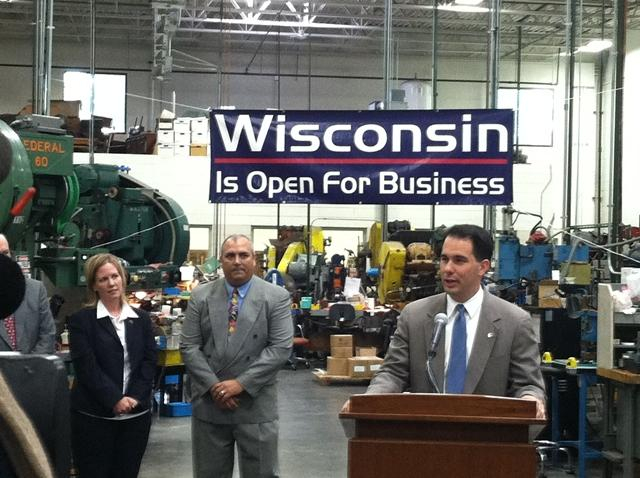Walker Violates Ban on Lottery Promotion?
State constitution says you can’t. But Walker’s budget jacks up advertising.
Wisconsin state budget bills are usually 1,000 or more pages in length and contain many small items that receive little or no attention. That is not to say, however, that serious questions cannot arise from the minutiae.
One example from the new 2017-19 budget makes the point. In the Department of Revenue section of the 632-page “Executive Budget” book is this request:
The Governor recommends increasing the lottery general program operations appropriation by $3 million in each year to be spent on current and additional informational activities to maintain and increase overall ticket sales. This will ensure continued property tax relief for Wisconsin homeowners through the lottery and gaming credit.
At the same time, the Wisconsin state constitution, Art. IV, Sec. 24 (6)(a) reads:
The expenditure of public funds or of revenues derived from lottery operations to engage in promotional advertising of the Wisconsin state lottery is prohibited. Any advertising of the state lottery shall indicate the odds of a specific lottery ticket to be selected as the winning ticket for each prize amount offered.
According to Merriam-Webster, advertising is “the action of calling something to the attention of the public especially by paid announcements”; the definition of promotion is “the act of furthering the growth or development of something.”
How do you reconcile the budget’s $6 million biennial spending request and Article IV, Section 24?
If you’re not legally inclined, consider some statistics. According to a mid-2016 report from the Legislative Audit Bureau, the Wisconsin lottery spent about $7.5 million on “product information” in each of the prior three fiscal years. During this same period, growth in lottery sales averaged 0.7%.
In 2003, the lottery spent $4.5 million on product information and generated $96.68 in sales per dollar spent. In 2008, it increased informational spending to $7.5 million and sales per dollar were $65.96. Since then, informational spending has remained unchanged and sales per dollar averaged about $70.
Given this abbreviated history, how do you evaluate the relationship between informational expenditures and lottery sales?
Todd Berry, president of the Wisconsin Taxpayers Alliance.
Op-Ed
-
Wisconsin Candidates Decry Money in Politics, Plan to Raise Tons of It
 Dec 15th, 2025 by Ruth Conniff
Dec 15th, 2025 by Ruth Conniff
-
Trump Left Contraceptives to Rot; Women Pay the Price
 Dec 8th, 2025 by Dr. Shefaali Sharma
Dec 8th, 2025 by Dr. Shefaali Sharma
-
Why the Common Council’s Amended Budget is Good Policy for Milwaukee
 Nov 20th, 2025 by Alds. Marina Dimitrijevic and Russell W. Stamper, II
Nov 20th, 2025 by Alds. Marina Dimitrijevic and Russell W. Stamper, II























Kill Gambling, pot, bad ideas.
Because both have devastated both Washington State & Colorado.
So if he is going to increase promotional spending thus reducing amount returned to the taxpayer who will be making money on the increased advertising? In other words who paid him to buy advertising space on their medium.
Every day that we get up, we need to thank Scott for not getting us into the Medicaid lottery that some states jumped into. The big article in WSJ tells how bad those states are getting killed, and how bad it will be when the US drops to 50% return as they have with the previous Medicaid. It will drive out schools, roads, everything. Unless the USA gives the money back to the states and lets them run it the rules will kill us.
Health car will swallow us all up unless it is designed poperly.
It’s been too long since I worked lottery policy for TGT [circa 1997], but LOttery always had advertising. I think it was one of those issue vs. express advocacy deals. Lottery ads could not urge folks to play, only let folks know the games existed. So I don’t see the big deal. Like Jesus said, gambling you will always have with you. A little risk is like salt and pepper on your scrambled eggs.
He should spend that 3M on tax cuts for the rich.
I luv the old socialists that keep banging on that drum and no one cares. Hillary tried that.